I’m watching the Rock (a.k.a., Dwayne Johnson) talk about shooting a bizarre action scene in The Rundown in which he and Sean William Scott were hanging upside down in the jungle while being attacked by monkeys. He’s talking about the physical and psychological stress of shooting this bit, and I’m surprised because I’d assumed the monkeys were CG, and maybe even that Johnson and Scott’s upside-down position was also created on a hard drive. CG effects have become so widespread and passe that none of us believe there’s any kind of taken-from-real-life reality to any kind of action scene in movies today. Everythg is digital paint, cartoon-ish…fake. The only thing we totally trust as being organically genuine are ordinary dialogue scenes, and even those will some day be suspect.
Month: October 2004
Hit-and-miss thing
For me, Richard Eyre’s Stage Beauty is a so-so, hit-and-miss thing, and the most glaring error is the casting of Billy Crudup as a kind of lady. He plays a 17th Century London stage actor named Ned Kynaston, whose was renowned in the early stages of his career for playing female roles (since women were forbidden to play women in those days). The diarist Samuel Pepys called Kynaston “the most beautiful woman on the London stage,” except that Crudup’s sharp nose and jutting chin make him look pointedly un-feminine or at the least unattractive by any sort of hot-girl standard. If I were to run into a “woman” who looked like Crudup at a party, I’d do a fast 180. Gael Garcia Bernal is very pretty (sort of Julia Roberts-like) when he appears in drag in Pedro Almodovar’s Bad Education, and the young Mick Jagger was quite attractive when he did his bisexual womanly thing in Donald Cammell and Nicolas Roeg’s Performance some 34 years ago. I didn’t even find Crudup’s high-pitched inflections and girly hand gestures very affecting. Jack Lemmon was more womanly in Some Like it Hot…really.
P.S.
Certain taste-maker journos around town are telling me Dylan Kidd’s P.S. (Newmarket, 10.15) isn’t good enough and therefore that Laura Linney’s shot at a Best Actress nom for her work in this film is in peril. I really think they’re wrong about this. This obviously smart, curiously romantic film is alive and originally plotted, it never drifts or bores, and Linney is radiantly readable in every frame.
Christopher Reeve
Christopher Reeve was a symbol of undying hope, fortitude and courage. What did he die of exactly? A New York Times story said that Reeve fell into a coma Saturday after going into cardiac arrest while at his home in Pound Ridge, New York. Reeve “was being treated for a pressure wound, a common complication for people in wheelchairs,” the Times story explained, adding that “these wounds result from constant pressure in one spot, reducing the blood to that area and finally killing the affected tissue.” Reeve had been suffering from a pressure-wound infection which had spread through his body, which eventually brought on the heart attack and then the coma.
I’m back now
Sorry I dropped out for three days, but I had a mild neurological freakout on Friday morning. In plainer terms, I kind of, heh-heh, “lost it” and thereafter decided on some primal deep-down level that I needed to re-charge for a day or two. Sorry — I’ll try not to let it happen again. Do I really mean that? Sure I do…as far as it goes.
Basic Instinct
It’s built into our genes to show obeisance before power. It’s obviously a big tendency in Hollywood circles, but hardly an exclusive one. Every culture, every species does the bow-down.
I was speaking the other night to this know-it-all guy who goes to a lot of Academy screenings and parties, and we were talking about possible Best Actor nominees. We’d both just seen Ray and knew for sure Jamie Foxx was a shoo-in, but who else?
“Paul Giamatti,” I said.
“Who?” he asked.
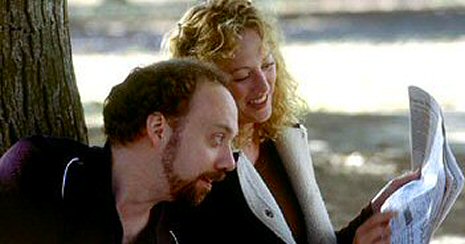
“The lead in Sideways,” I reminded him. “He’s amazing, heartbreaking… and the film is masterful.”
“Yeah, he was good,” he replied. Uh-huh…. not impressed. He’d seen Sideways and liked it, he said, but he had a certain criticism of something Giamatti did in the film that I’m not going to repeat. It was about something obscure that nobody anywhere has mentioned.
What he really meant, I suspect, was that he didn’t empathize with Giamatti and/or his “Miles” character because he’s balding and chubby and a bit of a loser, and the guy wasn’t feeling the tribal urge to celebrate the splendor of Giamatti’s craft. Because for him, superb performances in and of themselves lack a certain primal current.
< ?php include ('/home/hollyw9/public_html/wired'); ?>
Then he started in about Leonardo DiCaprio in The Aviator. He’d seen the upcoming Martin Scorsese film (opening 12.17) and didn’t want to tell me much, but he liked Dicaprio’s portrayal of Howard Hughes… mostly. But he had a couple of beefs. One was that Leo doesn’t look much like Hughes, and the other is that he looks too young.
“He’s 29 now,” I reminded.
“He looks like a kid.”
“But does he get Hughes?” I asked. “You know, does he channel him?”
He kept beating around the bush, but the basic answer seemed to be that he found DiCaprio worthy but not overwhelming.
“That’s what people said about him in Gangs of New York,” I replied. “Some said he was miscast, but I thought he was absolutely believable as an immigrant. He really had that scared-rat look in his eyes.”
The conversation went on a bit and then he suddenly flipped over. He said that based on his awareness of Academy types and their inclinations, DiCaprio would probably end up with a Best Actor nomination.
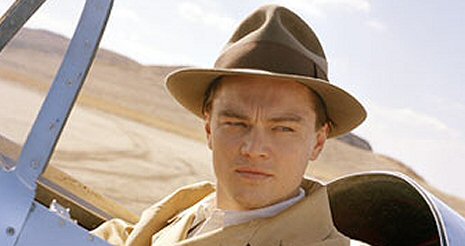
“But you just said he was pretty good but not great in the role, and looks like a kid and doesn’t really resemble Hughes,” I said.
Yeah, he said, but a Best Actor nom is still a likelihood, or so his instincts were telling him.
In other words, however good, pretty good or wonderful the Aviator might turn out to be, it’s a big expensive movie coming at the end of the year, and corporate-funded films that have spent well north of $100 million in their desire to win the admiration of the community are given the benefit of the doubt, sight unseen.
Big subject, big canvas, fascinating lead character grounded in old-Hollywood lore. Just what the Academy ordered. And so DiCaprio gets the come-hither and Giamatti has to struggle and prove himself and wait out on the sidewalk.
I realize, of course, that DiCaprio may be phenomenal in The Aviator. He’s a truly gifted actor. And I don’t trust that guy I spoke to at all — he’s not the most insightful, ahead-of-the-curve person I know.
But something smells in the town of Carmel when a performance as skilled and deeply expressive as Paul Giamatti’s in Sideways is reluctantly regarded as a “maybe.”
Respect
Laura Linney is one of our great actresses. She’s the successor to Meryl Streep. In just about every film she’s in, she kills.
I’m saying this because ’04 is turning out to be her best year since ’00, when she gave a pitch-perfect performance in Kenneth Lonergan’s You Can Count on Me and snagged a Best Actress Oscar nomination.
In my estimation, Linney has given far and away the best female lead performance in Dylan Kidd’s P.S. (Newmarket, 10.15), in which she plays a 40ish Columbia University admissions consultant who falls head over heels in love with a young student (Topher Grace) who seems like a dead ringer for a former boyfriend, and who might even be a reincarnation.
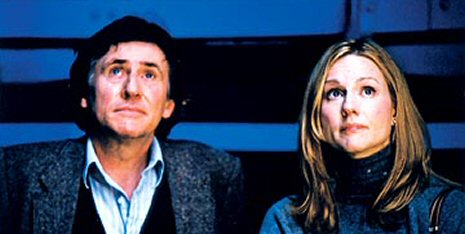
If you ask me, she’s also delivered the second-best supporting actress performance of the year (after Sideways‘s Virginia Madsen) as Liam Neeson’s spirited wife Clara in Kinsey.
Please send in any reactions to her performance in P.S. when it opens a week from today. I’m not over-reacting, but tell me if you think I am.
It’s good that these roles happened this year for Linney, since she had a terrible phase last year with two clunkers.
Her performance in the thoroughly revolting Love Actually was fine, but smothered in treacle as thick as Elmer’s Glue-All. There was nothing un-genuine about her performance in Alan Parker’s The Life of David Gale, but it was such a widely-panned film that it sank like a stone and took everyone down with it.
North
The plan was to drive up to San Francisco this morning to take in part of the Mill Valley Film Festival, which began last night (Thursday, 10.7) and continues until Sunday, 10.17. Except I decided this morning to blow the whole trip off, for reasons you don’t want to hear.
The plan now is to go up next weekend for the final three days. Festival director Mark Fishkin got David O. Russell to come up for Thursday’s opening-night showing of I Heart Buckabee’s, which opens in cities all over starting today (10.8). (Be sure to read Kim Morgan’s piece on Huckabee’s in her new High and Low column, which went up last night.)
Wired
A piece by Dave Lindorff that went up on Salon this morning (10.8) is keeping alive the Big Question of the Moment, which is about whether President Bush cheated during last week’s debate with John Kerry. The speculation is that he was fed cues and answers through an earpiece hooked up to a wireless receiver.
There’s a similar story about this by John Reynolds on Salon that went up last weekend. There’s also a site called www.isbushwired.com that gets into the whole thing with links and commentary.
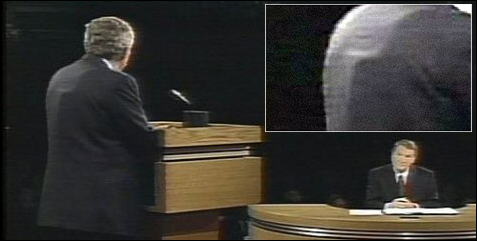
There are two pieces of evidence that make this charge hard to dismiss out of hand. One, there’s a photo taken of Bush’s back during the debate showing something bulging under his suit jacket, between his shoulder blades. Two, Bush inexplicably said “Let me finish” in the middle of responding to a Kerry statement when nobody was trying to butt in or challenge him.
The speculation is that Bush was listening to input from Karl Rove or some Rove flunky, and, being the stream-of-consciousness type, vocally and unintentionally told the earpiece guy to shut up while he was trying to make his point.
You can hear the sound bite here. And the photo in question shows some kind of solid object under Bush’s suit jacket poking through in the upper middle portion of his back.
We all know Bush is always being prompted and propped up tto within an inch of his life by his handlers, but relying on earpiece prompts during the debate, if it turns out to have actually happened, clearly isn’t cricket. Why isn’t “Hardball”‘s Chris Matthews all over this? The evidence isn’t conclusive, but it sure is intriguing.
Kenya
I heard from a reader named Peter MacKenzie in Nairobi, Kenya, the other day. I asked him what the weather is like, how the air smells, what the women are like, what movies are playing and how much it costs to get a beer in a local bar. Here’s his reply:
“Kenya is beautiful right now. I just went on safari for a couple of weeks with some friends visiting from the states. The ‘short rains’ start soon, but for now it’s sunny, dry and about 80 degrees every day. Although Nairobi is only about 50 miles from the Equator, it’s about the same altitude as Denver so it’s not too hot, not too cold most of the year.

“The air in Nairobi smells like burning trash and diesel exhaust a lot of the time, though once you get out of the city it’s about the freshest air you could ask for. And yes, there are some unbelievable women, though unfortunately many of the real knockouts can be seen hanging off the arms of dumpy septuagenarian British expats (shades of Michael Caine in The Quiet American).
“A bottle of Tusker (the local brew) will set you back 100 shillings (about $1.25) in the expat-frequented bars, and barely half that in the roadside shack pubs the local workers hit on their way home.
“Movies playing at the cinemas in Nairobi: King Arthur, Pride And Prejudice, The Terminal, Garfield, The Village, Chronicles of Riddick, I, Robot, Dodgeball, The Butterfly Effect and several Bollywood musicals for the local Indian community.
“Two four-screen movie theaters will be opening within five miles of my home in
the next six months, so hopefully the selection will improve.
“I would definitely recommend an East African safari if you ever have a couple of weeks to kill, thought there aren’t a lot of film festivals in the region to provide a work excuse (unless you think your readers absolutely need to be updated on the Zanzibar International Film Festival).”
Linney
“I’ve seen Laura Linney in P.S. and completely agree with you it’s the best work done by an American actress this year, although Kate Winslet in Eternal Sunshine of the Spotless Mind comes close in a role that is equally tricky and complex. There isn’t a note in this film that Linney doesn’t play, and her performance (and the film) gets deeper as the film progresses, particularly in the late scenes with Paul Rudd, Gabriel Byrne and Marcia Gay Harden.
“The relationship between the two women is at least as complex, if not more, than between Linney and Topher Grace. When was the last time you saw a female character in an American film who’s this developed and interesting on both personal and professional levels — daughter, sister, best friend, ex-wife, lover, possibly failed artist? Linney does it all here.
“And P.S. is a very clever film, using a potentially fantastical premise as a tool to deconstruct and repair a series of bitter relationships. I’m not sure if I can think of another actress who could sell me on this role, at least not with the number of dimensions Linney plays — angry, astonished, disillusioned, in love, confused, jealous, at peace. Possibly her best moment comes in a small scene set in a pool-hall restaurant where Grace says exactly the right thing to her at the right moment.
“Linney doesn’t striek me as the new Meryl Streep as much as a variation of Linney in each performance, which I mean not in any derogatory fashion. It’s just that she always seems to drive through films with a cynical, hard-edged intelligence that seems very contemporary, even in films like Kinsey and The House of Mirth. I thought Love Actually (you’re being too hard on this one) and Linney were both fine, though interesting that she’s the only one in the picture who ends up stoic and alone, without a happily-ever-after.” — Lee Shoquist

Wells to Shoquist: The saccharine grotesqueness of Love Actually aside (I wasn’t too hard on it — it’s a deeply disgusting film), your perceptions about Linney are very well put, and you’re obviously coming from a place of great feeling.
“Thanks for voicing your appreciation for the magnificent Laura Linney. I’d always liked her in the mediocre studio movies she was doing in the mid ’90s (Congo, Primal Fear, Absolute Power), and was glad when she started landing quality film roles in recent years.
“What sold me on Linney as a world-class talent, however, was seeing her on Broadway in Sight Unseen this past summer. I found her work was astonishing in a slightly above-average, somewhat dated play. The story unfolds out of chronological order, so that we transition between scenes of bitter ex-lovers meeting again in their late 30s and flashbacks to their college romance.
“The play climaxes when Linney’s ex-boyfriend, now a famous artist whom she never really got over, reveals that the only reason he’s tracked her down is to buy back a portrait he painted of her that is now worth a fortune. Linney’s character, who has since entered into a marriage of convenience and secluded herself in rural England, cherishes this piece as the one remnant of her youthful, happy self. When the ex-boyfriend and new husband convince her to give up the painting, her breakdown scene is gut-wrenching. No one in the
audience seemed to be breathing.
“Then the final scene of the play flashes back to when Linney and her ex (Angels in America‘s Ben Shenkman) first met, when she posed for the portrait. The transition from the bitter, lonely, heartbroken version of Linney’s character to the naive, youthfulversion is mesmerizing. You could swear she looked a decade younger.
“After the performance (a Saturday matinee in which my friend and I seemed to be the only people under 90), Linney even came out onstage in a bathrobe to do an audience Q&A, nobly responding to inane questions and shouts of ‘What’d she say?’ She seems like a real class act.” — Rob Watson, Boston, MA.
Sex Detective
I admired and enjoyed Bill Condon’s Kinsey (Fox Searchlight, 11.12) upon seeing it Monday night. It’s a smart, probing, movingly performed portrait of what it was like to live in sexually suppressed times, and how a startling work of research by an gangly odd-duck scientist named Alfred Kinsey (Liam Neeson) began to lift the cloak of sexual puritanism.
I’ve just made it sound like one of those plodding, dutiful, good-for-you biopics. It’s not. It’s alert and focused and keeps you thinking and re-thinking.
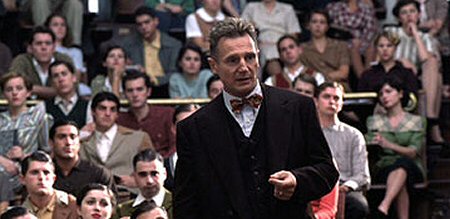
Neeson hasn’t been this concentrated and affecting since Schindler’s List (and this time without any “forgive me!” breakdown scenes). Costar Laura Linney, as Kinsey’s plucky wife Clara, delivers yet another perfectly-tuned performance. And John Lithgow’s acting as Kinsey’s constipated pathetic prick of a father sneaks up and touches you in a third-act scene — you go from hating the bastard to feeling compassion in one surprisingly swift stroke.
Kinsey is even a howl at times, and I’m surprised that the Toronto Film Festival reviews I read didn’t mention this more. It’s not a comedy, but when the laughs come they’re uproarious.
< ?php include ('/home/hollyw9/public_html/wired'); ?>
I’ve been asking myself whether this curious but undeniably intriguing story about what Kinsey went through in the 1940s and early `50s in delivering two culturally convulsive best-sellers about human sexual behavior (“Sexual Behavior in the Human Male” and “Sexual Behavior in the Human Female”) is going to touch people where they live, or at least make them care about Neeson’s heroic character.
As Caleb Crain’s Times article observed last weekend, “Not everyone applauds [Kinsey’s] accomplishment,” adding that there are those who “revile him as a fraud whose `junk science’ legitimized degeneracy.” There may be some people in the more conservative quarters of this country who will recoil slightly from the film, being of the belief that Kinsey helped bring about far-too-liberal attitudes about sexual matters in general, thus hastening the grim slide into the swamp.

But aren’t most of these people living in underground bunkers and old-age homes? Is there anyone with any advanced education or moderate sophistication who still feels queasy about sexual candor?
We live in an era, after all, in which a previous U.S. President found comic infamy a few years back as the recipient of an Oval Office blowjob. In which Kitty Kelley has reported that Dubya may have had extra-marital episodes. In which Vice President Cheney’s daughter is an uncloseted lesbian.
The U.S. is still a somewhat prudish nation in some respects, certainly compared to European folk, but isn’t every libidinal stirring known to man pretty much out on the media table these days? When a Kansas conservative like Bob Dole jokingly refers to being a Viagra man, you know sexual constipation levels aren’t what they used to be.
Feeling It
I caught Taylor Hackford’s Ray (Universal, 10.29) on Tuesday night, and the talk is not overblown: Jamie Foxx’s performance as the legendary Ray Charles totally, righteously kills. This is the exact sort of tour de force thing that always seems to hit a bulls-eye with the Academy. I almost said to myself, “This is it…he’s got the Best Actor Oscar.”
Then I reconsidered. This race isn’t over. Not with Paul Giamatti’s doleful sad-sack performance in Sideways kicking ass. The more I think about the moody dance that his lonely, pissed-off junior high-school teacher goes through, looking for love and struggling with a troubled novel, the more affecting it seems, especially given the quality of Alexander Payne’s film.
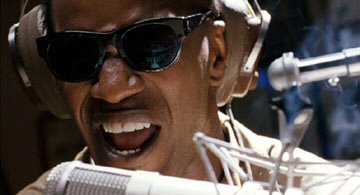
If you want to be provincial and small-minded about it, and I’m sorry to be passing these thoughts along, but the other apparent contenders have this or that strike against them.
Javier Bardem is moving and dignified in The Sea Inside, but the film is a bit too enamoured with the nothingness of death. Liam Neeson in Kinsey gives a beautifully measured performance, but a view that the real-life Kinsey was a bit of a perv gained a certain legitimacy from a piece that ran in last Sunday’s New York Times. Kevin Bacon’s acting in The Woodsman is top-drawer, but the sexual deviancy element is probably going to give some people pause.
I think these guys have all done superb work, but I (think I) know how Academy types tend to size things up.
The fact is that Foxx’s performance, which carries sensitivity and grace but also impresses because it’s a superb impersonation piece, is the only one that conveys that positive uplift theme (a gifted man is beset and nearly undone by his demons, but eventually overcomes them) that always seems to strike a chord.
I’ll get into the film itself down the road, but it’s clearly a foot-tapping, highly charged thing and pretty much impossible to resist. Hackford has assembled a right-down-the-middle biopic in most respects. It isn’t a Martin Scorsese or a Paul Thomas Anderson film. It more or less just tells a life story, albeit with rhythm and feeling.
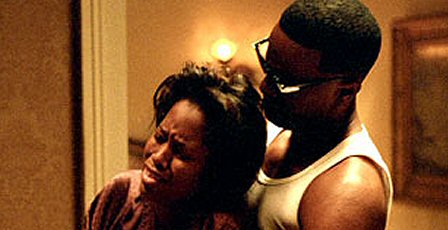
Sometimes a ball thrown straight across the plate is okay. Not every pitch has to be a curve or a slider or a knuckleball.
I also agree on some level with David Poland’s view that Ray runs a bit too long. To be fair, I’ve spoken to others about this and I seem to be in the minority. The odd thing is that I’ve thought it over a few times since last night and I can’t really figure what should have been cut. Maybe it needed a thousand tiny cuts. All I know is, I was feeling one of those Harry Cohn ass-twitchings during the last 20 to 30 minutes.
A friend of the film, responding to this concern, wrote the following on Wednesday morning: “I’d encourage you to see it again, despite of (or maybe because of?) its length. I have found that on my second and third viewings, my appreciation for how delicately Hackford feathers the drama and the music really grew. Now that you know the beats and the arc, you can really sit back and enjoy some of the finer filmmaking points.”
Recruiting
I’ve made this point before, but in trying like hell to fill Hollywood Elsewhere with all kinds of new columns and sidebars and whatnot, I’ve overlooked a logistical fact or two.
One, I can’t do everything, even at the pace I’ve been keeping (work days starting at 7 am and lasting until midnight or so, with time-outs for screenings). I can handle two weekly columns, the WIRED items, arranging for weekly DISPATCHES pieces from filmmakers, and editing and composing the regular contributor columns.
And two, I need more skilled contributors living on trust funds to pitch in and fill things out. The longer I do this, the more I realize that the appeal of Hollywood Elsewhere isn’t just about me and my big mouth, but a whole community of spirited film lovers — people who know how to write and need to be heard and ought to be heard.
I need some more people to send in VISITORS articles, interview transcripts that can go into VERBATIM, and writers who want to bang out DVD reviews for DISCLAND. Plus I need someone willing to do some grunt layout work with articles from time to time.
Squared Away
The Castle Keep DVD brouhaha is officially over, soothed and rectified.
Earlier this week I received a handsome widescreen version of Sydney Pollack’s 1969 anti-war film, and I have no complaints. Everyone can now dismiss from memory the pan-and-scan version released in August by Columbia TriStar Home Video. Unless, of course, CTHV president Ben Feingold approves the issuing of more pan-and-scan versions of widescreen films.
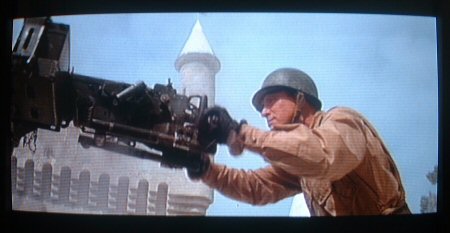
The hurried release of the widescreen version, due on 11.2, happened in response to an angry letter written sometime in mid-August by Steven Spielberg, George Lucas and Martin Scorcese to Sony vice-chairman Jeff Blake. The letter “raised hell” about the Castle Keep pan-and-scan transferring, according to an insider who read it. Blake passed the letter along to Sony honcho Michael Lynton, who in turn conveyed his concerns about negative p.r. to Feingold.
The Spielberg-Lucas-Scorsese letter also complained about a pair of Three Stooges DVDs released last August that offered colorized versions of four Stooges shorts, along with black-and-white versions. No word on what response, if any, CTHV had on the Stooges.
Rahoi’s Rant
Hollywood Elsewhere art director Jon Rahoi sent me the following last weekend about his experience with Ladder 49, the Disney-produced firefighter movie with John Travolta and Joaquin Pheonix:
“I usually give movies the benefit of the doubt,” he began. “I almost always leave the theater saying something nice or focusing on what I liked. It helps to be picky about what you see, but even so during the show I’m a forgiving viewer. It’s not until much later that any criticism works its way out.
“So imagine my surprise when, during the middle of Ladder 49, I actually thought about walking out. The last time this happened, Alec Baldwin was bombing Japan with Ben Affleck. You know how fun it is to be at a party where everyone else is drunk except you? Others in the theatre were laughing, sighing, and letting go with a sniffle or two. And there I was, the designated driver.
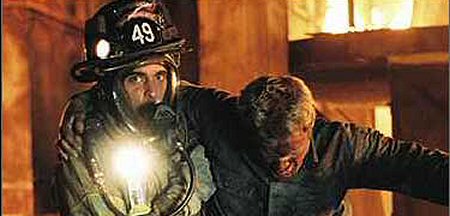
“My Cheese Detector beeped in the first few minutes, but it wasn’t off the charts. There were cardboard characters, jovial male-bonding scenes set to music, the “tell my wife I love her” scene, past footage of a beloved character freezing into a black-and-white photo scene, and even the obligatory get-hold-of-yourselves-after-a-devastating-tragedy scene.
“I know some firefighters, and most of them talk about how little they work. They talk about the pay, the benefits and the pension. That’s why most of them get into it in the first place. These are guys who were middle-of-the-roaders in school. Maybe they were athletes, maybe they got into it when that Business Admin degree was looking like less of a sure thing. They’re not haunted, and they’re not idealistic heroes living to help all. I respect them, but certainly don’t see them as heroic. It’s a job. They’re working just hard enough to avoid the axe, like every other schmuck in the western world.
“Every man in this crap movie is a hero. None of them do anything remotely human, except for the token aging asshole character cheating on his wife, the token father figure sharing how he chose his job over his wife, and the token black guy saying he didn’t want his kids to see him burned because “this is something kids don’t forget.” Who are these guys? If you want realistic firefighters, watch Rescue Me on F/X.
“Joaquin Phoenix lives with another hero-movie staple, the wet-blanket woman. Whether it’s Adrian in the Rocky movies, Aretha Franklin in The Blues Brothers, Diane Keaton in Godfather II or Gretchen Mol in Rounders, the wet-blanket woman is there to throw salt in the hero’s game, upping the personal stakes on his quest for glory.

“Pheonix’s wife (Jacinda Barrett) fights his longing to be a hero and urges him to take a safer job. I’m a father and a husband, and there’s no way I could fight off constant `you’re putting yourself in unnecessary danger’ scorn for ten years. And why would I want to? First of all, it’s not fair to the spouse — marriage is a partnership, not a sidebar to a career. It’s not like Baltimore needs him and only him.
“The wet-blanket woman character is based on a mistaken assumption, which is that a hero needs to listen only to his internal compass, and that his closest friends and family couldn’t possibly have anything important or informed to say about his situation. Because a man has to go his own way.
“What does it say about us that we cheer this attitude? We will our heroes into acting irrationally for the same reasons Earl gave Tiger a putter at 3 years, and why Jon Benet Ramsey wore makeup — we feel like failures. So instead of being happy with life, we force others to succeed for us.
“This movie could not have been made before 9/11. It’s a FDNY suckfest — they’re not fooling anyone by setting it in Baltimore. And just as movies in the late ’70s and ’80s paid hamhanded tribute to the fallen in Vietnam, it looks like we’re in for a rough few years of movies about the war on terror.
“Maybe some people will say I’m unpatriotic or an unfeeling ass. But how heroic is it to take stupid risks to the eternal chafe of your soulmate, and to eventually leave your wife and two kids to fend for themselves?
“‘Yes, Daddy’s a hero. Now look really sad when you hold up the cardboard sign.'”
Alleged Commie
“My wife and I both felt the same way you seem to regarding Janet Leigh’s performance in The Manchurian Candidate until we happened to read an article airing the theory Leigh’s Eugenie Rose is a Communist agent assigned to keep watch over Frank Sinatra’s character.
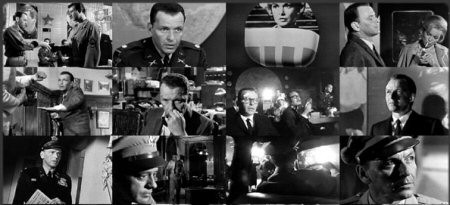
“That odd conversation she has with him on the train is used as an example of her taking control over him by her use of words (just as a card and words are used to control Laurence Harvey). This explains why he goes immediately to her apartment, as well as some of the reaction shots of Leigh’s face when Sinatra is telling her what is going on. Her expression is particularly chilling during their last encounter near the end of the film.
“Anyway, I cannot say if this idea is right or wrong, but when we watched the film recently with this thought in mind, Leigh’s character worked much better for us.” — Wade Warshal.
Wells to Warshal: Yeah, I’ve heard that one. It doesn’t hold water or add up in the slightest in terms of what John Frankenheimer directed or George Axelrod wrote, but if the boat floats for you, fine.
In the newspaper today
In a piece honoring the recently deceased Janet Leigh, L.A. Times critic Carina Chocano says in today’s edition (10.5) that Leigh’s best films — Touch of Evil, Psycho and The Manchurian Candidate — amounted to “a dark trilogy, [in which she played] an icy, un-settling and alienated woman, a cynically tragic ur-feminist.” I’d leave room for a fourth character in this vein: the embittered ex-wife of Paul Newman’s down-at-the-heels shamus in Jack Smight’s Harper (1966), which boasted a finely-tuned script by William Goldman. The angry and wounded Susan Harper was surely a more substantial part than Leigh’s bizarre Candidate character, Eugenie Rose, who did little more than dab Frank Sinatra’s bruised face with a handkerchief and tell him how wonderful and adorable he was.
Pupet sex
After nine submissions, the MPAA ratings board has finally given Matt Parker and Trey Stone’s political satire Team America: World Police (Paramount, 10.15) an R rating. The org had been threatening to label the Scott Rudin-produced film with an NC-17 rating over a simulated oral-sex scene between puppets. The board had presumably been adamant about this because any puppet movie will presumably attract a good number of minors, but of course it can’t be legally seen by minors with an R or NC-17 rating, so what are they on about? Do they think in this day and age that any 12 or 13 year-olds who manage to slip in regardless aren’t completely jaded about (and in some instances engaging in) sexual behavior of this sort?
Jellyfish
The perception that Kerry won last week’s debate has wiped out President Bush’s lead in the race, according to the latest Newsweek poll. In the first national telephone survey following last Thursday’s debate, the newsweekly found that the race is now statistically tied among registered voters, with 47 per cent favoring Kerry vs. 45 per cent for Bush. All this means is that swing voters are total jellyfish. They all tumbled for Bush after the well-produced macho swagger of the Republican convention, giving him an 8 to 10-point lead, and then Kerry “wins” the debate and they all swing in the other direction because…is it okay to say this? Because swing voters are impressionable little weather vanes who want only to follow whoever’s got the heat.
Stunning performance of an odd duck
29 year-old Leonardo DiCaprio’s performance as Howard Hughes in The Aviator (Warner Bros., 12.17) is “stunning,” producer Michael Mann has told Empire magazine. “Particularly in the second half, when he’s playing an older Hughes. He’s pheonomenal. It’s a really excellent piece of work.” A draft of John Logan’s script that I read in ’02 strongly suggests that the $100 million biopic won’t be about Hughes’ romantic dalliances with Kate Hepburn, Ava Garner and Jean Harlow as much as his passionate devotion to the task of making machines do things the world’s never seen before. Director Martin Scorsese may well deliver a beautifully made film with superb performances, but I wonder if audiences will warm to The Aviator, given Hughes’ basic weirdness….he was really an odd duck.
A movie with heart…or is it?
So Shark Tale did just shy of $50 million on its first weekend…big deal. A movie can be a box-office leviathan and people can still hate it. Everyone says it’s mainly about other movies, it’s got no heart, and the only good voice-actor performance is Martin Scorsese’s. Last May I attended a big DreamWorks presentation for Shark Tale at the Cannes Film Festival (footage, luncheon, and personal appearances by Will Smith, Jack Black and Angelina Jolie) As DreamWorks honcho Jeffrey Katzenberg introduced the footage he called it “a movie with heart.” Heart was precisely the missing component in the footage they showed, and I asked several journo pals if they had the same impression, and every last one of them shrugged and changed the subject and ate their food.
